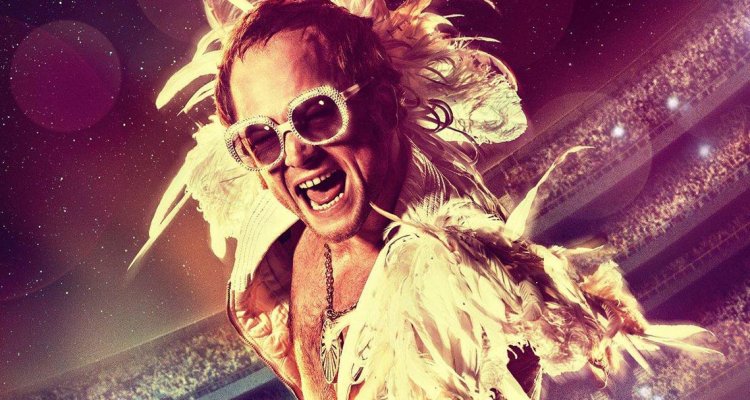“There are moments in a rock star’s life that define who he is and how people perceive him as he ascends into the heavens,” John Reid (Richard Madden) tells a young Elton John (Taron Egerton) halfway into “Rocketman.” It’s a corny line, but also an effective one — dually for Elton, who’s immediately seduced, and for us, eagerly awaiting the inevitable explosion of Elton John’s stardom onscreen.
READ MORE: 2019 Cannes Film Festival: The 21 Most Anticipated Movies
That mélange of corniness, pathos, and fan service is at the heart of Dexter Fletcher’s musical biopic, which premiered out of competition at the Cannes Film Festival. Told in flashback by an adult Elton in rehab, “Rocketman” traces Elton’s humble origins as Reggie Dwight, “a fat kid from nowhere” living with a negligent father (Steven Mackintosh) and a self-absorbed mother (a miscast Bryce Dallas Howard, who ages so gradually one wonders at moments whether Elton is the same age as his mother). Young Reggie (played sweetly by Matthew Illesley, then Kit Connor) only finds parental support in the form of his grandmother (Gemma Jones), who enrolls him at the Royal Music Academy and jumpstarts his path to becoming, well, Elton John. One electrically charged pub performance of “Saturday Night’s Alright For Fighting” later, Elton teams up with good-natured songwriting partner Bernie Taupin (Jamie Bell), effortlessly churns out an early (yet somehow final) draft of “Your Song,” and skyrockets to fame.
READ MORE: the 100 Most Anticipated Films Of 2019
“Rocketman” does not purport to be much more than an elaborate work of spectacle, jam-packing 20 excerpted musical numbers into its two-hour runtime, replete with meticulous recreations of Elton John’s most iconic costumes. Yet Fletcher knows that audiences are hungry for precisely this kind of spectacle, even if they know it’s primarily bells, whistles, and glittery costumes — which is exactly what “Rocketman” delivers, down to its last sequin. Fletcher’s inventive reimagining of several musical numbers, in particular, blends striking visuals and affecting storytelling: “Rocket Man,” half-sung underwater in a drug-addled daze, swells in lush orchestration, while “Honky Cat” is staged as a flashy hedonist romp.
READ MORE: The 25 Best Films Of 2019 We’ve Already Seen
That spectacle, however, is not without human cost, as Fletcher shows with increasingly disorienting scene transitions. As Elton’s success mounts, he continues to grapple with alienation from his parents (his mother grudgingly takes him back in, while his father reinvents himself with a new family), while also medicating the newfound adversities of fame with cocaine and handfuls of pills.
READ MORE: Summer Movie Preview: 35 Films You Shouldn’t Miss
If there’s any pathos to be found in this arc, it is largely to the credit of the film’s leading man, Taron Egerton, who brings a compelling verve to the role that is simultaneously impressionistic and original. Egerton’s Elton John carries himself with a panache that thinly veils more deeply seeded insecurity, once sowed by upbringing and exacerbated repeatedly by the trials of fame. “My dealer was out of town, and this seemed like the best alternative,” he quips at the rehab center, then softens and admits, “I’m here because I want to get better.” Whether belting “Crocodile Rock” to an ecstatic crowd at the Troubadour, or rehearsing manic smiles in the mirror to stave off stage fright and depression, Egerton squarely shoulders the emotional gravitas of an otherwise flare-focused feature.
Here, though, a dark kind of meta-cinematic irony is at work. Even while Fletcher depicts the torturous burden and exploitative nature of fame, he also fundamentally depends on its showiness. The exact spectacle that “Rocketman” blames for Elton John’s downward spiral just so happens to fuel the whole enterprise. For all the scenes of Elton’s substance abuse, family problems, and bulimia, Fletcher just as readily cuts to visual eye-candy, as high-energy choreography, bright lights, and glittery set pieces perpetuate the pitfalls of fame’s excesses, even to his audience. Somehow amidst all the noise, even Egerton’s sincerity feels like a kind of engrossing pageant, transparently constructed before our eyes. “Real love’s hard to come by, so you find a way to live without it,” Elton says wistfully. Though the film may instruct us to view the spectacle with a critical eye, we’re just as vulnerable to it as Elton is, easily seduced by the promise of the limelight and a glittery show. [B]

